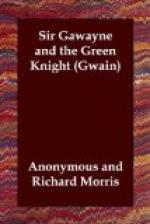[Sidenote A: The hunters cheer on the hounds,]
[Sidenote B: which fall to the scent forty at
once.] [Sidenote C: All come together by the
side of a cliff.] [Sidenote D: They look about
on all sides,] [Sidenote E: and beat on the bushes.]
[Sidenote F: Out there rushes a fierce wild boar,]
[Sidenote G: At the first thrust he fells three
to the ground.] [Sidenote H: Full quickly the
hunters pursue him.] [Sidenote I: However, he
attacks the hounds, causing them to yowl and
yell.]
[Footnote 1: fro (?).]
XIII.
[A] Schalke3 to schote at hym
schowen to þenne,
Haled to hym of her arewe3, hitten hym oft;
1456 Bot þe poynte3 payred at þe pyth þat py3t
in his schelde3,
& þe barbe3 of his browe bite non wolde,
[B] Þa3 þe schauen schaft schyndered in pece3,
Þe hede hypped a3ayn, were-so-euer hit hitte;
1460 [C] Bot quon þe dynte3 hym dered of her dry3e
stroke3,
Þen, brayn-wod for bate, on burne3 he rase3,
[D] Hurte3 hem ful heterly þer he forth hy3e3,
& mony ar3ed þerat, & on-lyte dro3en.
1464 Bot þe lorde on a ly3t horce launces hym
after,
[E] As burne bolde vpon bent his bugle he blowe3,
He rechated, & r[ode][1] þur3 rone3 ful þyk,
Suande þis wy[ld]e swyn til þe sunne schafted.
1468 [F] Þis day wyth þis ilk dede þay dryuen on þis
wyse,
Whyle oure luflych lede lys in his bedde,
[G] Gawayn grayþely at home, in gere3 ful ryche
of hewe;
1472 Þe lady no3t for3ate,
Com to hym to salue,
Ful erly ho wat3 hym ate,
His mode forto remwe.
[Sidenote A: The bowmen send their arrows after this wild swine,] [Sidenote B: but they glide off shivered in pieces.] [Sidenote C: Enraged with the blows,] [Sidenote D: he attacks the hunters.] [Sidenote E: The lord of the land blows his bugle,] [Sidenote F: and pursues the boar.] [Sidenote G: All this time Gawayne lies a-bed.] [Footnote 1: The Ms. is here almost illegible.]
XIV.
1476 [A] Ho commes to þe cortyn, & at þe kny3t totes,
Sir
Wawen her welcumed worþy on fyrst,
&
ho hym 3elde3 a3ayn, ful 3erne of hir worde3,
[B] Sette3 hir sof[t]ly
by his syde, & swyþely ho la3e3,
1480 & wyth a luflych loke ho layde[1] hym þyse
worde3:
“Sir,
3if 3e be Wawen, wonder me þynkke3,
Wy3e
þat is so wel wrast alway to god,
&
conne3 not of compaynye þe coste3 vnder-take,
1484 & if mon kennes yow hom to knowe, 3e kest
hom of your mynde;[Fol.]
[C] Þou hat3 for-3eten
3ederly þat 3isterday I ta3tte [111]
alder-truest
token of talk þat I cowþe.”
“What
is þat?” quod þe wyghe, “I-wysse I wot
neuer,
1488 If hit be sothe þat 3e breue, þe blame is
myn awen.”
[D] “3et I kende
yow of kyssyng,” quod þe clere þenne,
“Quere-so
countenaunce is couþe, quikly to clayme,
Þat
bicumes vche a kny3t, þat cortaysy vses.”




